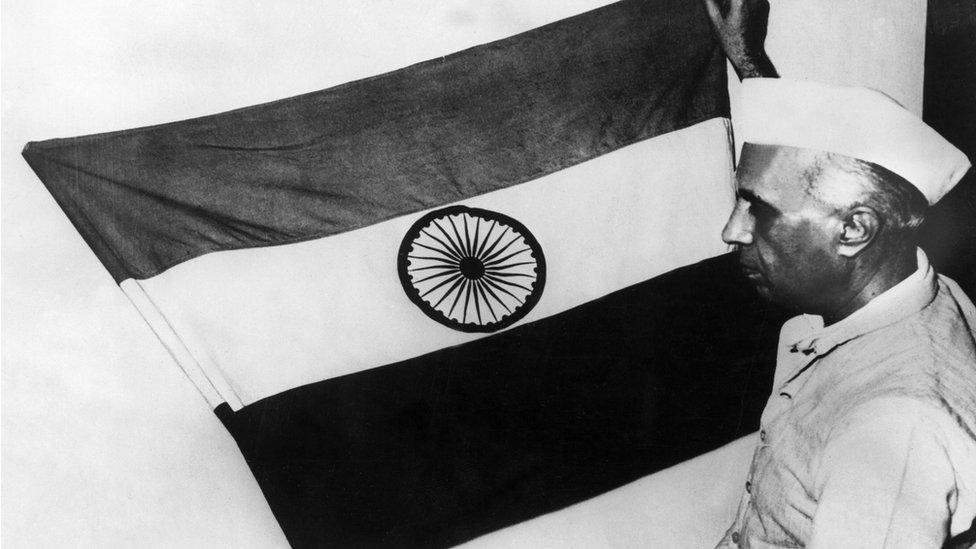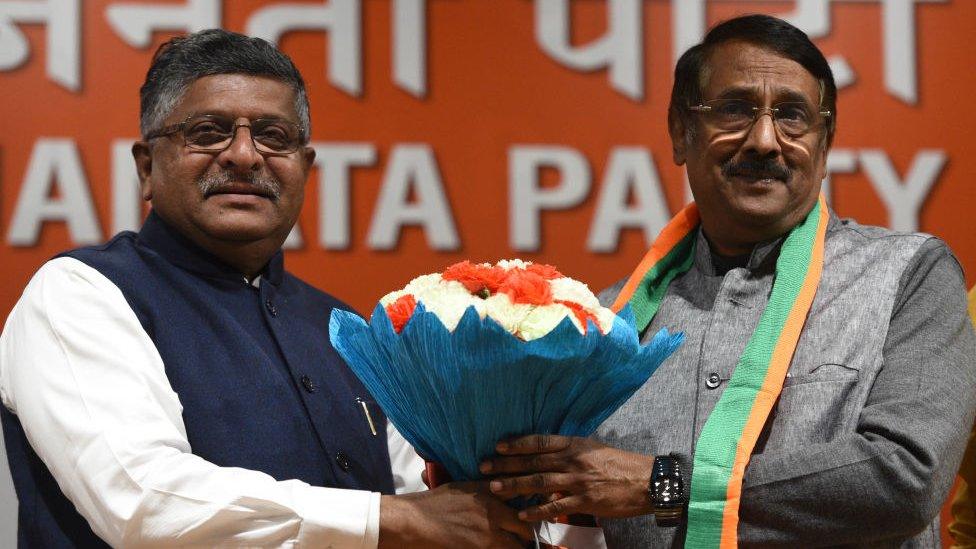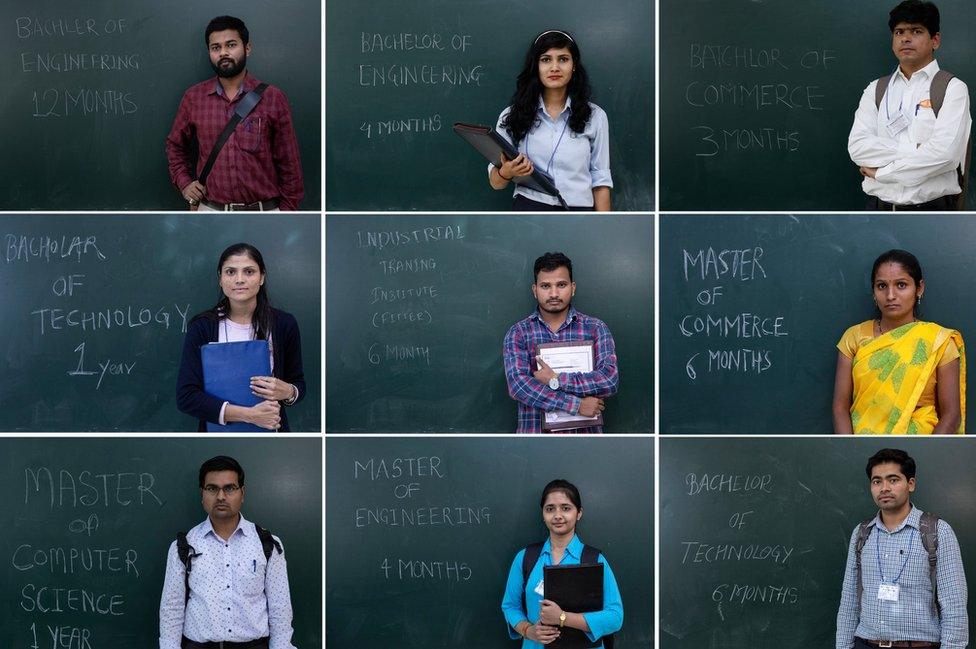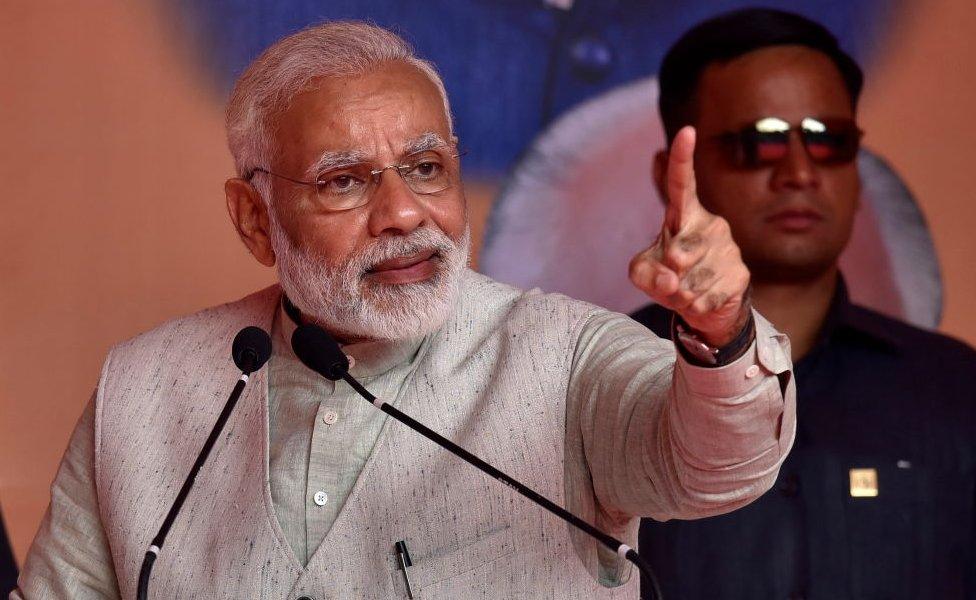India election 2019: The week that was
- Published

India has entered full election mode: voting is due to begin on 11 April, with the final ballot cast more than five weeks later on 19 May. Every day, the BBC will be bringing you all the latest updates on the twists and turns of the world's largest democracy.
The latest from the campaign trail
Shashi Tharoor's defence of Nehru
What happened?
Congress leader and former UN diplomat Shashi Tharoor has rubbished claims by the ruling Bharatiya Janata Party (BJP) that India's first Prime Minister is the reason that China blocked a fourth bid to designate the leader of a Pakistan-based militant group a terrorist.
The BJP had responded to a mocking tweet by Congress leader Rahul Gandhi which called the prime minister "weak" by saying it was Nehru who had backed China's bid for a permanent seat on the UN security council.
But Mr Tharoor begged to differ:
Allow X content?
This article contains content provided by X. We ask for your permission before anything is loaded, as they may be using cookies and other technologies. You may want to read X’s cookie policy, external and privacy policy, external before accepting. To view this content choose ‘accept and continue’.
Why does this matter?
Nehru has been the favourite whipping boy for the ruling BJP for a while now. They blame him for everything from the creation of Pakistan to the loss of territory in the disputed Kashmir region.
Allow X content?
This article contains content provided by X. We ask for your permission before anything is loaded, as they may be using cookies and other technologies. You may want to read X’s cookie policy, external and privacy policy, external before accepting. To view this content choose ‘accept and continue’.

There are also a number of conspiracy theories about the family that regularly make the rounds in India.
The Congress leadership, who are Nehru's direct descendants, have often not engaged with these jibes. This has cost them control over the narrative. By having a well-respected intellectual like Mr Tharoor come to his defence and show that the BJP is manipulating facts, the Congress is now hoping to counter that.
However, this time it's reasonably safe to say that this particular BJP attack on Nehru has not found many takers, as this front page from an Indian newspaper shows:
Allow X content?
This article contains content provided by X. We ask for your permission before anything is loaded, as they may be using cookies and other technologies. You may want to read X’s cookie policy, external and privacy policy, external before accepting. To view this content choose ‘accept and continue’.


Tom Vadakkan's blow to Congress
What happened?
Political leader Tom Vadakkan's shock decision to leave the opposition Congress party after more than 20 years and join the BJP on Thursday is still the biggest talking point on Friday.
He told reporters that he made the decision after becoming "upset" with his party's response to a suicide attack which killed 40 troops in Indian-administered Kashmir last month.
The Congress has tried to dismiss his departure as a "non-issue".
Why does it matter?
Although he was not a very high profile figure in the Congress, Mr Vadakkan was still important. He was known to be close to former party president Sonia Gandhi and functioned as a national media spokesperson.
Some will undoubtedly see his departure as a lack of faith in the leadership of her son, Rahul Gandhi, who has been trying to "shake things up" since he took the reins in December 2017. There has been speculation for some time that the "old guard" of the party has not been happy with the way Mr Gandhi has been trying to change things.

Others may see it as a sign that the Congress is set to lose badly yet again, and that Mr Vadakkan is simply trying to abandon the sinking ship.
But it's not just the Congress that has been losing people to the BJP.
The Indian Express newspaper notes that in the last month alone, 28 leaders from different opposition parties have joined the ruling party.
Many of these defections have come from the politically crucial state of Uttar Pradesh, which sends 80 MPs to parliament. The BJP, which saw a huge victory there in 2014, is this time facing a tough challenge from the state's two main regional parties, which have forged an alliance against them.
It is wooing disgruntled leaders from both parties, some of whom have had to give up on their personal ambitions in order to prop up the alliance.
This "chipping away" of opposition parties is starting to look like a key part of the BJP's poll strategy to weaken its rivals ahead of the vote.

Thursday saw politics over foreign policy
Congress mocks PM Modi over Masood Azhar vote
What happened?
During an election, everything becomes about politics - even, apparently, votes at the UN security council.
The opposition Congress party was quick to paint the news that China - which is a close ally of Pakistan - had blocked a fourth attempt by member states to designate Jasih-e-Mohammad chief Masood Azhar a global terrorist as a foreign policy failure by Mr Modi.
Allow X content?
This article contains content provided by X. We ask for your permission before anything is loaded, as they may be using cookies and other technologies. You may want to read X’s cookie policy, external and privacy policy, external before accepting. To view this content choose ‘accept and continue’.
Opposition leader Rahul Gandhi's mocking tweet refers to Mr Xi's 2014 visit to India, when he sat on a traditional swing with Mr Modi in his home state of Gujarat, before joining the prime minister for a private dinner.
Allow X content?
This article contains content provided by X. We ask for your permission before anything is loaded, as they may be using cookies and other technologies. You may want to read X’s cookie policy, external and privacy policy, external before accepting. To view this content choose ‘accept and continue’.
But since then, India's relationship with China has not been the best.
Why does it matter?
Part of Mr Modi's appeal to Indian voters is the fact that they see him as the man to lift the country into its "rightful place" on the global stage.
His supporters have pointed to his often effusive exchanges with world leaders, his "rock star" rallies in venue's like Madison Square Gardens in the US and Wembley Stadium in the UK as examples of his mass international appeal. He is also extremely popular with Indian communities overseas.
Since 2014, every diplomatic victory India scores has been attributed to him. What's more, his popularity has reportedly soared following weeks of tensions with Pakistan. Even in his rallies, he has often referred to India's military action as "Modi teaching Pakistan a lesson".
If China had not blocked the proposal against Masood Azhar again, this would have been undoubtedly painted as another instance of his diplomatic prowess. Therefore it is unsurprising that the Congress has latched on to this opportunity to try to poke a hole in this image.
Will it stick though? That is the question.

Jobs, jobs... jobs?

Unemployment is a major issue for Indians in the 2019 election. Pictured: Jobseekers, alongside their qualifications
What is happening?
Sources have told the Indian Express that a report detailing the number of jobs created under a government scheme will not be released for another two months, external - or, put another way, until most of the country has voted.
The delay to the Micro Units Development & Refinance Agency (Mudra) scheme report is the third such report to be delayed ahead of the election.
It is unclear what the findings of the report are, and the Express newspaper says the government has been "tight-lipped" about it.
Why does it matter?
Well, according to a jobs report which was leaked earlier this year, India's unemployment rate is the highest it has been since the early 1970s.
Unsurprisingly, that means jobs are top of many voters wish-lists when it comes to electing their next government,
And, as job creation was one of current Prime Minister Narendra Modi's main promises back in 2013, any bad news on the employment front is likely to be bad news for the ruling BJP.
Modi's India: Is Modi failing the jobless?

Wednesday was all about the women
What happened?
West Bengal Chief Minister Mamata Banerjee has released the All India Trinamool Congress' (TMC) list of candidates - and, 41%, or 17 out of 41, are women. It's a starry list - it has two top regional actresses, Mimi Chakraborty and Nusrat Jahan. Moon Moon Sen, a former actress who won in the 2014 election, will also be contesting again.
"I am so happy. This is a proud moment for us," Ms Banerjee said, challenging other parties to do the same.
Read more: The firebrand leader from eastern India
Why does it matter?
Female voter turnout has been steadily going up over the last few years, but the fact of the matter is, while seats in India's village councils have been reserved for women since the early 1990s, parliament is still dominated by men.
As women become a more powerful voting block, parties are realising they need to actively target them.
Previously, politicians have wooed women with costly schemes and concessions, but it is becoming more and more clear that a party doesn't just need to woo women voters, it needs to represent them.
And, following the realisation, no one is willing to be left behind: Congress leader Rahul Gandhi offered up his own promises on Wednesday, saying the opposition party would bring in the Women's Reservation Bill - which would mean 33% of seats in parliament would be reserved for women - this year if it came to power, some 20 years after it was first proposed.

Narendra Modi channels his inner Bollywood
What happened?
The Prime Minister has been sending out a barrage of tweets since Wednesday morning, tagging celebrities, media personalities and even rival politicians, telling them to use their influence to get more people to vote.
He tweeted roughly every two minutes, each time tagging a different set of people - each with a personalised message. These ranged from "a high turnout augurs well for our democratic fabric" to "the core of badminton is the court and the core of democracy is the vote".
However, our personal favourite is the one in which he channelled the iconic tagline from the 1990s' Bollywood blockbuster Kabhi Kushi Kabhie Gham: "It's all about loving your family."
Tagging the two male leads of the film, Shah Rukh Khan and Amitabh Bachchan as well as its director Karan Johar, the tweet finished with "it's all about loving your... democracy".

Priyanka Gandhi gets social
What happened?
Priyanka Gandhi has finally debuted on Twitter, sending two tweets just hours after she made her first speech as a fully-fledged politician in Mr Modi's home state of Gujarat.
"In the simple dignity of Sabarmati, the truth lives on," her first tweet read, followed moments later by another - a photo, and a Mahatma Gandhi quote.
The calm nature of the Congress politician's tweet was in contrast to her fierier tone earlier in the day.
"Your vote is a weapon, your awakening is a weapon, your awareness is a weapon, so use it wisely because you are going to choose your future," she told a cheering crowd in Gujarat, in a speech which left many comparing her to her grandmother, the former prime minister.
Why does this matter?
A social media presence is key for any modern politician, as PM Modi's 46.3 million followers will tell you. Used well, it can garner you millions of votes. Used badly, it can destroy a career before it has even got started.
How Ms Gandhi will fare remains to be seen. However, it is likely her brother Rahul - the Congress leader who has found himself trending for both positive and negative reasons over the last few hours - will be on hand to give her some advice.

Also on Tuesday....
Hardik Patel was on stage with Rahul Gandhi
What happened?
Hardik Patel enjoys massive support among his Patidar community
Hardik Patel, the firebrand social activist who rose to fame challenging Prime Minister Modi in his home state of Gujarat, made his first public appearance with the opposition Congress party.
Mr Patel was on stage as Congress leaders like Rahul Gandhi and Priyanka Gandhi addressed a large rally in Gujarat to officially flag off the party's election campaign.
He announced he was joining Rahul Gandhi's party on Sunday.
The 25-year-old commerce graduate, who was not old enough to stand for election under India's rules until this year, first rose to political fame as the face of massive caste protests which rocked Mr Modi's state in 2015.
Patel is known for leading a movement demanding that the Patels - or the Patidar caste - be given better access to jobs and education through the quota system.
Read more: How Mr Patel rose to challenge Modi
Why does this matter?
Mr Patel's decision to join Congress, a dynastic party hoping to reinvent itself in this year's election, is significant. The opposition hopes that he will be pivotal in swinging the vote in Gujarat, and for good reason.
His speeches and fiery oratory have attracted millions of supporters - many of whom have traditionally voted for Mr Modi's ruling Hindu nationalist Bharatiya Janata Party (BJP), which has ruled Gujarat for more than two decades.
"He brings mass appeal for the Congress, which is something the party has desperately sought in the past 20 years," said Ankur Jain, BBC Gujarati's editor. "They've never had a leader as popular as him in Gujarat."
Mr Patel has been seen as a strong threat to the BJP ever since 2015, when caste protests took off in Gujarat. "He became a prominent voice of dissent for shaking up the status quo in Gujarat," our editor explained.
So, should the BJP be worried? Possibly. But remember they still managed to win the state election in 2017.
"It was a close call though as the party did lose seats - and Mr Patel is one of the main reasons behind that," notes Ankur Jain.

And Monday saw...
Concerns over the election schedule, which was finally unveiled on Sunday revealing a seven stage process which will begin on 11 April and end on 19 May.
Why does the schedule matter?
Well, while the schedule's length is nothing unusual - India's first election in 1951-52 took a total of three months to complete - a number of people are pointing to the unusual way some states have been split up.
For example, West Bengal - where the majority of MPs are from the Trinamool Congress (TMC) - will vote over seven separate dates.
Could this have an impact on the overall vote? Possibly, according to elections expert Sanjay Kumar.
"Multiple phases in one state is not ideal," Mr Kumar, director of the Centre for the Study of Developing Societies, wrote on Twitter., external "Campaign in neighborhood constituency within same state would impact voting decision."
But could that give one party an unfair advantage? Some on social media have certainly suggested it may - particularly when it comes to the ruling BJP.
Others dismissed the allegation as rubbish. For example, senior Economic Times editor Shantanu N Sharma suggested the four-phase vote in the small state of Orissa could be down to the need to move federal forces needed to patrol the polling stations from one region to the other.
Local police are seen to be partisan, so federal forces have to deployed to secure polling stations. The forces have to be freed from their duties and moved all around the country.
Allow X content?
This article contains content provided by X. We ask for your permission before anything is loaded, as they may be using cookies and other technologies. You may want to read X’s cookie policy, external and privacy policy, external before accepting. To view this content choose ‘accept and continue’.

In fact, he went as far as to suggest the set-up is actually "disadvantageous to the ruling party"., external
And there are other things to consider when it comes to the schedule and how it will affect the outcome: Mr Kumar points out the choice of days - over weekends, holidays and even Mondays - could bring voter turnout down, external in some areas.
The Electoral Commission, meanwhile, has not given precise details of how it put the schedule together.

What about last week?
The election hadn't even been announced, but no one could have been unaware that it was coming: the BJP had placed adverts in 150 newspapers across the country extolling its successes over the last five years - all of which had to come to a stop on Monday, due to election rules.
Want to know more about India's 2019 election? Our correspondent Soutik Biswas has put together this handy explainer.

How do the Lok Sabha elections work?
India's lower house of parliament, the Lok Sabha, has 543 elected seats. Any party or coalition needs a minimum of 272 MPs to form a majority government.
Some 900 million voters - 86 million more than the last elections in 2014 - are eligible to vote at 930,000 polling stations.
Electronic Voting Machines (EVMs) will be used at all polling stations. The entire process will be overseen by the Election Commission of India.
Who are the main players?
Prime Minister Narendra Modi who won a landslide victory in 2014 is seeking a second term for both himself and his Bharatiya Janata Party (BJP).
His main challengers are the main opposition Congress party led by Rahul Gandhi, and a consortium of regional parties called the Mahagathbandhan (which translates from the Hindi into massive alliance).
The Mahagathbandhan has seen some of India's strongest regional parties, including fierce rivals, come together.

Many see the upcoming election as a referendum on Mr Modi
This includes the Samajwadi Party (SP) and the Bahujan Samaj Party (BSP) led by Dalit icon Mayawati, normally fierce rivals in the northern state of Uttar Pradesh, which sends the most number of MPs to parliament.
The alliance also includes the Trinamool Congress which is in power in the state of West Bengal and Arvind Kejriwal whose Aam Aadmi Party (AAP) rules Delhi.
The aim of the alliance is to consolidate regional and anti-BJP votes, in order to oust Mr Modi from power.
Other regional players including Tamil Nadu's DMK and AIADMK and Telangana's TRS in the south are not part of the alliance, but are expected to perform well in their own states, which is likely to make them key to any coalition government.
When do I vote? The dates at a glance
11 April: Andhra Pradesh (25), Arunachal Pradesh (2), Assam (5), Bihar (4), Chhattisgarh (1), J&K (2), Maharashtra (7), Manipur (1), Meghalaya (2), Mizoram (1), Nagaland (1), Odisha (4), Sikkim (1), Telangana (17), Tripura (1), Uttar Pradesh (UP) (8), Uttarakhand (5), West Bengal (2), Andaman & Nicobar (1), Lakshadweep (1)
18 April: Assam (5), Bihar (5), Chhattisgarh (3), Jammu and Kashmir (J&K) (2), Karnataka (14), Maharashtra (10), Manipur (1), Odisha (5), Tamil Nadu (39), Tripura (1), UP (8), West Bengal (3), Puducherry (1)
23 April: Assam (4), Bihar (5), Chhattisgarh (7), Gujarat (26), Goa (2), J&K (1), Karnataka (14), Kerala (20), Maharashtra (14), Odisha (6), UP (10), West Bengal (5), Dadar and Nagar Haveli (1), Daman and Diu (1)
29 April: Bihar (5), J&K (1), Jharkhand (3), MP (6), Maharashtra (17), Odisha (6), Rajasthan (13), UP (13), Bengal (8)
6 May: Bihar (1), J&K (2), Jharkhand (4), Madhya Pradesh (MP) (7), Rajasthan (12), UP (14), Bengal (7)
12 May: Bihar (8), Haryana (10), Jharkhand (4), MP (8), UP (14), Bengal (8), Delhi (7)
19 May: Bihar (8), Jharkhand (3), MP (8), Punjab (13), Bengal (9), Chandigarh (1), UP (13), Himachal Pradesh (4)
23 May: Votes counted
Key: Date: State (number of seats being contested))
- Published10 April 2019